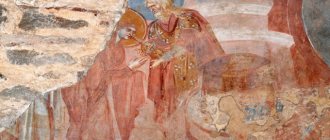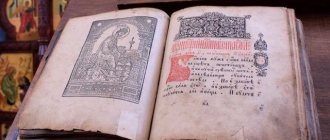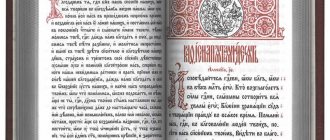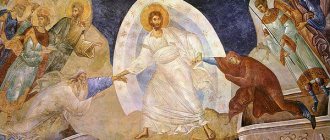Christian Library of God's Messages
There are 77 books in the Orthodox Bible, each of them tells about a certain period in the history of mankind and the formation of faith in the Creator. How to read the Bible correctly in order not only to be filled with historical information, but also to understand the meaning of God's revelations?
Orthodox Bible
You can get closer to the concept of God and learn His plan only from the Holy Scriptures.
Unlike Protestants, the Orthodox Church continues to study the Word of God, transmitted both in the Old and New Testaments, and through Traditions recorded from the oral memories of participants in those events. Since the 16th century, Protestants have abandoned the Sacred Traditions as not divinely inspired, for they were not written in Hebrew.
We read the Word of God not to memorize, but to feel the breath of God Himself
— By what criteria can one determine a positive result from regular reading of the Holy Scriptures? By the number of memorized quotes?
— We read the Word of God not for memorization. Although there are situations, for example in seminaries, when exactly this task is set. Biblical texts are important for spiritual life in order to feel the breath of God Himself. In this way, we become familiar with the grace-filled gifts that exist in the Church, we learn about the commandments, thanks to which we become better, and draw closer to the Lord. Therefore, studying the Bible is the most important part of our spiritual ascent, spiritual life. With regular reading, many passages are gradually memorized without special memorization.
https://www.pravlife.org/content/kak-pravilno-chitat-bibliyu-mitropolit-antoniy-pakanich
How many books are in the Orthodox Bible
The Orthodox Holy Scripture consists of 77 books, unlike the Protestant Bible, which has only 66 messages.
66 books are considered canonical, their texts were found in Jewish primary sources, 11 Old Testament books were translated from Greek, and their texts were questioned as inspired by God. The Old Testament in Orthodoxy consists of 50 books, 39 of which are recognized as having been written under the direction of God, for their texts are found in the Jewish Tanakh.
11 books written in Greek are considered non-canonical: Tobit, Judith, Wisdom of Solomon, Wisdom of Jesus, son of Sirach, Epistle of Jeremiah, Baruch, second and third books of Ezra, three Maccabees books. Without these books it is impossible to imagine the historical and spiritual value of the Creator's revelations.
Ancient scroll
The 27 books of the New Testament that describe Jesus' earthly life are not controversial. They contain 4 Gospels, the Acts of the Apostles, 19 Epistles of the Apostles and the Apocalypse.
Even once the Gospel can be read in different ways
In connection with this question, I remembered a conversation between an Orthodox priest and a Jewish rabbi on one of the YouTube channels. As the discussion progressed, the speakers touched on the topic of reading the Holy Scriptures, and the rabbi said that he read the Gospel once in his life - when he was studying, the senior rabbis allowed him to. All his impressions were limited to the fact that he drew attention to contradictions and inaccuracies.
When I heard this, the image of Metropolitan Anthony of Sourozh popped into my head, who also read the Gospel once - and it turned him upside down. He was fourteen years old at that time, it was a period when he was going through a teenage crisis and moving to Europe, was carried away by the thought of how to free Russia from communist power - was on a wave of radical patriotism. And at that time he heard from the priest that you need to love your enemies, bless those who curse and turn the other cheek.
At home, he opened the Gospel of Mark, because it is the shortest, and when he finished reading, he felt that Christ was next to him. He did not see Him with his own eyes, it was not a hallucination - he simply clearly realized His presence at the moment when he finished reading. Of course, this changed his life a lot, and we all know that he subsequently became a deeply religious man. From these examples we can conclude that the Gospel can be read in different ways.
How to Read the Bible and See Its Value
Orthodox canons recommend reading the Holy Scriptures in parallel with the Holy Traditions written by the Fathers of the Church in order to better understand the revelations.
For believers who are beginning to learn the Bible for the first time, it is advisable to receive the blessing of a spiritual mentor and listen carefully to his advice. Before you start reading the Holy Scriptures or Sacred Traditions, you should pray, ask the Almighty to bless and give wisdom to understand everything written.
Prayer to Jesus Christ
Lord Jesus Christ, open the eyes of my heart, so that when I hear Your Word, I understand it and fulfill Your will. Hide not Your commandments from me, but open my eyes, that I may understand the wonders of Your law. Tell me the unknown and secret of Your wisdom! I trust in You, my God, and I believe that You will enlighten my mind and meaning with the light of Your mind, and that then I will not only read what is written, but also fulfill it. Make it so that I do not read the Lives of the Saints and Your Word as a sin, but for renewal and enlightenment, and for holiness, and for the salvation of the soul, and for the inheritance of eternal life. For You, Lord, are the illumination of those who lie in darkness, and from You is every good gift and every perfect gift. Amen.
Sequence of reading the New Testament
- It is best to study the Holy Scripture, or rather the New Testament, the Gospel with the Good News transmitted by the Apostle Luke, who was a doctor by profession and lived in the time of the Apostle Paul. The Gospel of Luke gives the most detailed earthly biography of Jesus Christ, from genealogy to ascension.
- Some priests advise reading Mark first. This message is the shortest and easiest to read.
- Take your time to explore the other three gospels. Continue to enjoy Luke's revelations as conveyed in the Acts of the Apostles, which describe the lives of Jesus' disciples after His ascension to the Father.
- The Apostle John left his Gospel as a legacy to his descendants. Being the beloved and youngest disciple of Christ, John was able to convey to Christians the meaning of Jesus’ main mission - to save the world for the sake of God’s glory.
- Information about the earthly ministry of Christ is supplemented by the Gospels of Mark and Matthew.
- The letters to the churches written by the four apostles, Peter, Paul, James, and Jude, are surprising and delightful in their relevance to the problems of modern churches.
- The revelations recorded in Ephesians will help you feel truly protected by God and know your rights as an heir of the Living God.
- The Epistle to the Philippians will help restore the joy of communion with the Lord and give a new awareness of churching.
- The most difficult to read is the Apocalypse, written by the Apostle John during his exile on the island of Patmos. This revelation is encrypted and open to a select few.
Advice! Don’t rush to read the entire New Testament; at the same time, don’t get hung up on selected phrases pulled from the text. To understand the meaning of the message, try to find comments specifically on this text in order to understand the time and place of writing. There are entire volumes of commentaries on each book.
Reading the Bible
How to Read the Old Testament
After studying the New Testament, you can move on to the Old Testament, which contains laws that, according to Jesus himself, are a teacher for Christians.
- You shouldn't read everything. For example, having begun to get acquainted with the Old Testament, having read Genesis, Exodus, do not rush to learn Numbers and Levites, this requires a special understanding. It is better to study such books with the help of a spiritual guide.
- Notice Deuteronomy 28 gives the principles of blessing and cursing.
- The Book of Judges and Kings will reveal the historical aspect of the life of the Jews and the actions of God there.
- After reading historical books about the lives of kings, you can begin to get acquainted with the psalms. The reading of Psalms, such as 50, 90, 22 and others, is included in the prayer order of Orthodox Christians, but not everyone knows that these texts are taken from the Psalter, part of the Old Testament, which consists of 150 songs.
About the Psalms:
- Psalm of David 99
- Psalm of David 70
- Psalm of David 58
Experienced Christians have a whole list of psalms, divided into groups, which are read in various life situations:
- illness;
- on the road;
- despondency;
- depression;
- loneliness;
- anxiety and others.
Discover Proverbs. You know that there is a saying among Christians that reading one parable a day drives away the devil. The Bible contains 31 parables, one for each day of the month. Reading for the first time these messages, received by King Solomon and written down under the guidance of the Holy Spirit, you are amazed at their wisdom.
Wisdom, which is what Solomon asked God for when He asked about the king’s desires, made King Solomon the richest and wisest ruler in all the days of people’s lives on earth.
Wise Solomon
When reading Proverbs, you sometimes forget that they were written several thousand years ago, they are so relevant today.
Getting acquainted with the Holy Scripture for the first time, many former communists will see in it the principles of the Communist Party Manifesto, so there is nothing new under the sun. The great Russian writer Kuprin wrote Shulamith based on the Song of Songs and the life of King Solomon, using entire paragraphs from the Bible.
After reading an incomprehensible text, do not throw it aside, write it down in a notebook and turn to experienced Christians. Sunday school teachers, who, as a rule, are at every church, will be good helpers in this matter.
The main thing is to have a sincere desire to know the Word of God
— How to study the Bible correctly? Is it worth starting knowledge from the first pages of Genesis?
— The main thing is to have a sincere desire to learn the Word of God. It's better to start with the New Testament. Experienced pastors recommend getting acquainted with the Bible through the Gospel of Mark (that is, not in the order in which they are presented). It is the shortest, written in simple and accessible language. Having read the Gospels of Matthew, Luke and John, we move on to the book of Acts, the Apostolic Epistles and the Apocalypse (the most complex and most mysterious book in the entire Bible). And only after this can you begin to read the Old Testament books. Only after reading the New Testament, it is easier to understand the meaning of the Old. After all, it was not for nothing that the Apostle Paul said that the Old Testament legislation was a teacher to Christ (see: Gal. 3: 24): it leads a person, as if a child by the hand, to let him truly understand what happened during the Incarnation, What in principle is the incarnation of God for a person...
In what language to read the Bible
The original texts of the books of Holy Scripture are written in various languages:
- Hebrew;
- Aramaic;
- Greek;
- Latin.
No one argues that reading books from the original source gives the most accurate idea of what the author of the letter wanted to convey to the reader. In modern libraries there are practically no primary sources, only translations. The Holy Scriptures have been translated for almost all peoples of the world, so it is better to start reading it in your native language.
About the Bible texts:
- Prophecy from the Bible
- Biblical story of Adam and Eve
- Prayer before and after reading the Gospel
Sometimes, in order to understand some incomprehensible place in the Holy Scriptures, it is necessary to have several Bibles from different translators, and it is better if someone speaks several languages, then in a foreign one. If Jesus spoke in Aramaic, only the words “love, the word” there have multiple meanings.
Advice! Do not rush to read the Bible in Church Slavonic, start with the Holy Scriptures translated into your native, understandable language. The Church recommends that beginning readers of messages from the Creator begin with the Synodal Translation of the Bible, which has been time-tested and has had a great influence on the development of Russian culture.
Bible. Books of the Holy Scriptures of the Old and New Testaments
According to the priests, spiritual food should be served to people in the language in which it will be better absorbed and beneficial. The Holy Traditions, the epistles of John the Theologian and the apostolic conversations will help you better understand the Holy Scriptures.
It is important to understand that reading the Holy Scriptures is part of the spiritual achievement
— What if the reader does not understand some episodes of the Bible? What to do in this case? Who should I contact?
— It is advisable to have books on hand that explain the Holy Scriptures. We can recommend the works of Blessed Theophylact of Bulgaria. His explanations are short, but very accessible and deeply ecclesiastical, reflecting the Tradition of the Church. The conversations of St. John Chrysostom on the Gospels and Apostolic Epistles are also classic. If any questions arise, it would be a good idea to consult with an experienced priest. It is necessary to understand that reading the Holy Scriptures is part of a spiritual achievement. And it is very important to pray, to cleanse your soul. Indeed, even in the Old Testament it was said: wisdom will not enter an evil soul and will not dwell in a body enslaved to sin, for the Holy Spirit of wisdom will withdraw from wickedness and turn away from foolish speculations, and will be ashamed of the approaching unrighteousness (Wisdom 1: 4-5) .
Why should Christians read the Bible?
The Holy Scriptures are God's revelations to people; in order to understand them, one should prepare to read the Bible. Even in monasteries, young novices are recommended, before studying the Holy Scriptures, to first read the traditions of the Church Fathers and the letters of the apostles in order to understand the essence of the matter.
The Bible is a mirror of human nature, and sometimes not everything it says is what people like. In this case, we should think about what is wrong in our lives, maybe the Creator wants to change our character in this way, awaken our conscience, reduce our pride, and all this only in order to bring us closer to Himself, to fill us with the Kingdom of God.
If a person does not want to hear the voice of the Creator, then he listens to the devil. There is no middle ground on this issue.
The church does not require memorizing biblical passages, but by regularly reading a particular text, exploring revelations on certain issues, such as love, obedience, faithfulness, healing, and others, writing down favorite passages, and there will certainly be some, people begin to quote them by heart. This does not require special memorization.
Regular reading of the Holy Epistles will eventually become a necessity and will fill you with spiritual strength. This process can be compared to the hard training of athletes who dream of becoming winners. There is no need to strive to embrace the immensity; you can read 1-2 chapters every day, preferably in the morning after prayer, in order to “drink” of living water, receiving God’s knowledge for the whole day.
Modern Christians should thank God for the grace given to have their own Bible, to freely read the Holy Scriptures every day, to go to church; under Soviet rule, this could lead to imprisonment. Truly, we have and do not value.
Daily reading of Holy Scripture in obedience will allow us to find in it God Himself and Jesus Christ, whose existence runs like a red thread through the Old and New Testaments.
By getting to know the Creator, Christians merge with Him into one whole, filling themselves with the Creator’s love. According to one priest, reading the Bible is like sailing in a small boat on a huge ocean.
Bible in Church Slavonic
Before studying the Holy Scriptures, you need to familiarize yourself with the works of the holy fathers
- So, you need to prepare for reading the Holy Scriptures in a special way?
— Experienced elders in monasteries gave the novice a rule: before studying the Holy Scriptures, you first need to familiarize yourself with the works of the holy fathers. Bible readings are not just studying the Word of God, they are like prayer. In general, I would recommend reading the Bible in the morning, after the prayer rule. I think it’s easy to set aside 15-20 minutes to read one or two chapters from the Gospel, the Apostolic Epistles. This way you can get a spiritual charge for the whole day. Very often, in this way, answers to serious questions that life poses to a person appear.
Ostromir Gospel (1056 - 1057)
It's complicated?
Yes, it may be difficult at first, but it's not scary. The main thing is to read. In this regard, I remember a parable about how a novice came to his confessor and complained that he was reading the Scriptures, but did not understand anything. “Take a dirty jug, pour water into it, and then pour it out,” said the elder. The young man did what he was told. The elder asked to repeat this several times, and then look into the jug. "What do you see?" - he asked. “I see that the jug has become cleaner,” answered the novice. “So are you!” When reading the Gospel, we may not fully understand it, but the trace of reading remains: the soul, mind, heart become purer.
Nowadays it’s common to scold Kuraev, but he had good thoughts, which I agree with. He once said that he finds many things in Christianity that he does not understand, and this convinces him that it is true. If everything was clear, it would mean that people had gathered who came up with everything, wrote it down and logically sorted it into sections so that no doubts would arise. We have a whole list of theological questions that have no answers. And these incomprehensible moments convince us of one thing: we know about God exactly as much as He Himself revealed to us. He is incomprehensible - and, nevertheless, he became the same as us, he came into our world, and this is absolutely amazing.
The Gospel for us is a navigator, an instruction for life. If you build your life according to it, it heals the soul and relieves many problems: anxiety, neurotic concern, fears and phobias.
In summary, I would like to encourage our readers to study the Holy Scriptures, because it brings order and harmony to our will, mind and feelings. We need to read it so that there is no porridge in our heads, but, as St. Paisius the Svyatogorets writes, “a factory of good thoughts.” If the mind is occupied with reading Scripture, then it will be possible to restore order in life. If you change yourself, everything around you will change. Isn’t this a reason to turn to the Gospel as often as possible?
Archpriest Konstantin Lisnyak
Source











